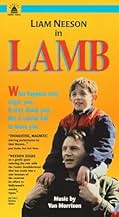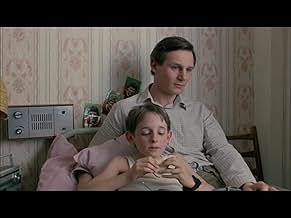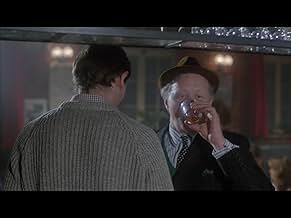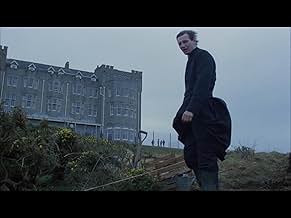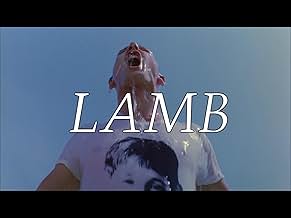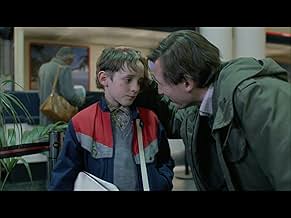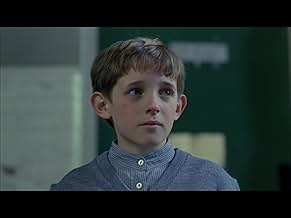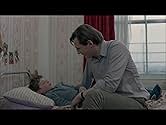Agrega una trama en tu idiomaAn Irish reform school priest questions his calling as a young, epileptic runaway arrives. Each recognizes the other as kindred spirits and escape together. As police close in and money dwin... Leer todoAn Irish reform school priest questions his calling as a young, epileptic runaway arrives. Each recognizes the other as kindred spirits and escape together. As police close in and money dwindles, the desperate priest makes bad decisions.An Irish reform school priest questions his calling as a young, epileptic runaway arrives. Each recognizes the other as kindred spirits and escape together. As police close in and money dwindles, the desperate priest makes bad decisions.
- Premios
- 2 premios ganados y 1 nominación en total
Opiniones destacadas
Two souls propping each other up from moment to moment as they challenge the world, knowing there's a price to be paid for their rebellion. They are beautifully crafted archetypes living life to its fullest with all its agony and bliss and they dance together flawlessly. Reminds me of the lives of tortured geniuses like Caravaggio and Van Gogh whose work transcends.
The answer of how an electro shock can be inspiring, is buried within this little film. Unapologetic to a fault. Tense, and tender. It grabs you by the throat and doesn't let you go. I understand the outcries about the ending, but, what did you expect? In a painful, shattering way, the ending is utterly rewarding, true to its message, even if it leaves you gasping for air. Interesting to notice, Gianni Amelio's masterpiece "Stolen Children" seems a remake of "Lamb" a film that, by its very nature, should appear impossible to emulate. If you're not afraid of an emotional wallop, go for Lamb.
'Lamb' is the story of an ill-considered dream, told with a very particular flavor. It's rough around the edges, but engrossing for the story it has to impart, a bit intriguing given the very early roles of the cast - and far more dark than the premise lets on.
Early scenes provide sufficient exposition to establish the characters and their motivation. Michael Lamb is a priest flailing in his faith, especially in light of the cruelty and abuse of power he sees at the reform school where he works. Owen, a young boy of 10 prone to seizures, is dumped at the school by his decidedly unloving mother, and there suffers the wrath of schoolmate and schoolmaster alike.
The plot begins in earnest as the two of them, equally ill at odds in their surroundings, abscond together with hopes of something better. Yet neither are truly prepared for what that entails, and every step feels like a disaster waiting to happen. It's hard not to feel a little on edge with every passing scene as Michael and Owen's circumstances grow increasingly difficult.
'Lamb' is very notable as the film debut of Hugh O'Conor, only 10 years old when it was released. Even at such a tender age, he demonstrated a force of personality befitting such a troubled youth. He is a fine scene partner with costar Liam Neeson, appearing here in an early film role. Neeson bears a slightly less gritty version of the gravity and pensiveness that he's become known for in the latter half of his career, but Michael very much fits the character of roles he's taken on since. Ian Bannen, in an early supporting part, carries an especially despicable smarm about him as repugnant headmaster Brother Benedict.
The acting is quite good, and the technical craft of the film is suitable. The real substance of 'Lamb' is in the narrative, with the screenplay adapted by Bernard MacLaverty from his own novel. We feel like vicarious Cassandras, knowing that disaster is coming, and Michael himself is increasingly aware the ride dream won't last long. For all the rapport that Michael and Owen share, scenes of their bond are gratifying, yet it's an idealist venture that they embark on. Their efforts to continue on grow more breathtakingly dire until at last the climax and finale arrives with an even gloomier, more intense outcome than we had come to anticipate. It's a fine ending, as written, but I don't think it's unreasonable to say that for the conclusion, 'Lamb' may actually be the darkest of all Neeson's films.
Just as the greatest asset of the movie is its story, its greatest weakness is in how the story is presented. The narrative flow is cohesive, but not totally solid. Michael and Owen's departure from the reform school isn't treated with much care, happening as quickly and nonchalantly in the feature as I'm typing these words. The cumulative factors that result in the ultimate outcome make rational sense as story beats and motivational considerations, and moments throughout the film emphasize those beats - if somewhat half-heartedly. Yet the key to that grouping of elements is in a line of dialogue that is spoken so fast and casually that it's easy to miss, and with or without it, the climactic capstone is rendered with less profundity than it should meaningfully broadcast.
While uneven, 'Lamb' is an enjoyable and suitably engrossing movie. It's especially worthwhile for fans of the cast. The content may not find favor with those who have special concern for how children are treated in fiction; even for those without such specific concerns, this remains rather difficult. Still, for those willing, it's a deserving viewing experience, and worth seeking out for the imperfect strength of its narrative.
Early scenes provide sufficient exposition to establish the characters and their motivation. Michael Lamb is a priest flailing in his faith, especially in light of the cruelty and abuse of power he sees at the reform school where he works. Owen, a young boy of 10 prone to seizures, is dumped at the school by his decidedly unloving mother, and there suffers the wrath of schoolmate and schoolmaster alike.
The plot begins in earnest as the two of them, equally ill at odds in their surroundings, abscond together with hopes of something better. Yet neither are truly prepared for what that entails, and every step feels like a disaster waiting to happen. It's hard not to feel a little on edge with every passing scene as Michael and Owen's circumstances grow increasingly difficult.
'Lamb' is very notable as the film debut of Hugh O'Conor, only 10 years old when it was released. Even at such a tender age, he demonstrated a force of personality befitting such a troubled youth. He is a fine scene partner with costar Liam Neeson, appearing here in an early film role. Neeson bears a slightly less gritty version of the gravity and pensiveness that he's become known for in the latter half of his career, but Michael very much fits the character of roles he's taken on since. Ian Bannen, in an early supporting part, carries an especially despicable smarm about him as repugnant headmaster Brother Benedict.
The acting is quite good, and the technical craft of the film is suitable. The real substance of 'Lamb' is in the narrative, with the screenplay adapted by Bernard MacLaverty from his own novel. We feel like vicarious Cassandras, knowing that disaster is coming, and Michael himself is increasingly aware the ride dream won't last long. For all the rapport that Michael and Owen share, scenes of their bond are gratifying, yet it's an idealist venture that they embark on. Their efforts to continue on grow more breathtakingly dire until at last the climax and finale arrives with an even gloomier, more intense outcome than we had come to anticipate. It's a fine ending, as written, but I don't think it's unreasonable to say that for the conclusion, 'Lamb' may actually be the darkest of all Neeson's films.
Just as the greatest asset of the movie is its story, its greatest weakness is in how the story is presented. The narrative flow is cohesive, but not totally solid. Michael and Owen's departure from the reform school isn't treated with much care, happening as quickly and nonchalantly in the feature as I'm typing these words. The cumulative factors that result in the ultimate outcome make rational sense as story beats and motivational considerations, and moments throughout the film emphasize those beats - if somewhat half-heartedly. Yet the key to that grouping of elements is in a line of dialogue that is spoken so fast and casually that it's easy to miss, and with or without it, the climactic capstone is rendered with less profundity than it should meaningfully broadcast.
While uneven, 'Lamb' is an enjoyable and suitably engrossing movie. It's especially worthwhile for fans of the cast. The content may not find favor with those who have special concern for how children are treated in fiction; even for those without such specific concerns, this remains rather difficult. Still, for those willing, it's a deserving viewing experience, and worth seeking out for the imperfect strength of its narrative.
I must profess the only reason I taped this film when it was shown recently on Australian ABC TV was because I saw that Liam Neeson and Ian Bannen were in it.
I therefore began watching it knowing absolutely nothing about it. I came away feeling slightly disappointed, but overall I found it enjoyable.
The story concerns a priest, played with suitable piousy by Neeson, a man whos faith is slowly ebbing away in the face of hardship.
His eye falls to a newcomer to the school at which he works, a young boy called Owen who seems to have quite a chip on his shoulder, and does not like authority of any kind.
The two develop a friendship, and, at a crucial moment, the priest decides to kidnap the boy and travel to London and better climes. He tells Owen that he has talked to his mother and gained permission to have him for a while.
They spend a while in London (living off an advance of his inheritance from his recently departed father), and get quite close.
But Owen suffers from epilepsy, a condition which requires constant medication. And when the money and drugs start running out...
Lamb is quite a routine picture for much of its length, lacking any real emotional depth until the last 20 minutes. Its length is perhaps a bit long, with its paper thin plot stretched out to accommodate this.
Apart from the last 20-30 minutes where the desperation starts to set in and they run out of money, resorting to more seedier accommodation, it really lacks the hook to keep a viewer interested.
4 out of 10.
I therefore began watching it knowing absolutely nothing about it. I came away feeling slightly disappointed, but overall I found it enjoyable.
The story concerns a priest, played with suitable piousy by Neeson, a man whos faith is slowly ebbing away in the face of hardship.
His eye falls to a newcomer to the school at which he works, a young boy called Owen who seems to have quite a chip on his shoulder, and does not like authority of any kind.
The two develop a friendship, and, at a crucial moment, the priest decides to kidnap the boy and travel to London and better climes. He tells Owen that he has talked to his mother and gained permission to have him for a while.
They spend a while in London (living off an advance of his inheritance from his recently departed father), and get quite close.
But Owen suffers from epilepsy, a condition which requires constant medication. And when the money and drugs start running out...
Lamb is quite a routine picture for much of its length, lacking any real emotional depth until the last 20 minutes. Its length is perhaps a bit long, with its paper thin plot stretched out to accommodate this.
Apart from the last 20-30 minutes where the desperation starts to set in and they run out of money, resorting to more seedier accommodation, it really lacks the hook to keep a viewer interested.
4 out of 10.
10gbb1909
One of coldest, driest, most painful film ever made in England. A love story with sad irony, but no humorism. You will appreciate a young Liam Neeson, in one of his first effort as protagonist. And the lovely and desperate little Hugh O'Conor: he will face the priests' life again, as one of them,in Lasse Halstrom's CHOCOLAT (2000). A picture you'll never forget.
¿Sabías que…?
- TriviaOne of only five (it being the third) music scores (to date, February 2015) for a full length feature film composed by Northern Irish singer-songwriter and musician Van Morrison.
- ConexionesReferenced in Wogan: Episode #10.86 (1990)
Selecciones populares
Inicia sesión para calificar y agrega a la lista de videos para obtener recomendaciones personalizadas
- How long is Lamb?Con tecnología de Alexa
Detalles
- Fecha de lanzamiento
- País de origen
- Idioma
- También se conoce como
- Лэм
- Locaciones de filmación
- King Arthur's Castle Hotel, Tintagel, Cornwall, Inglaterra, Reino Unido(St Kiaran's Reform School)
- Productoras
- Ver más créditos de la compañía en IMDbPro
Taquilla
- Total en EE. UU. y Canadá
- USD 5,076
- Fin de semana de estreno en EE. UU. y Canadá
- USD 3,070
- 26 feb 1995
- Total a nivel mundial
- USD 5,076
- Tiempo de ejecución1 hora 50 minutos
- Mezcla de sonido
Contribuir a esta página
Sugiere una edición o agrega el contenido que falta


